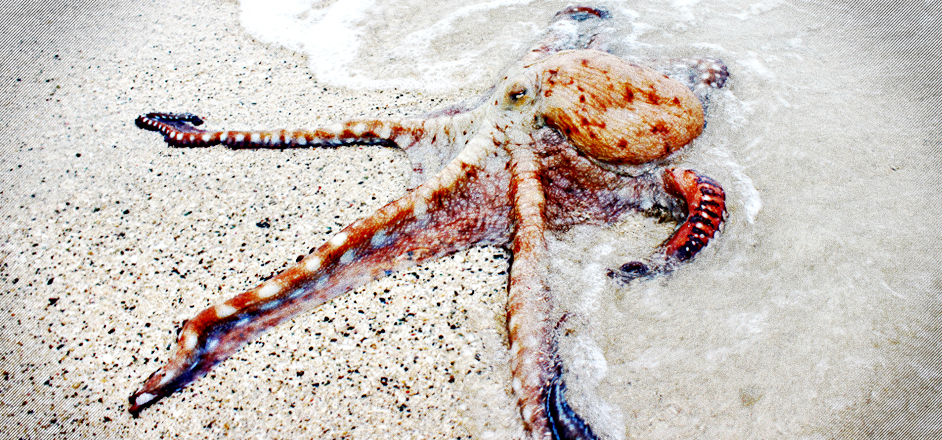Let’s take a moment to talk about octopi (Octopuses? Octopussies?), because, well, there’s no easy way to say this — but they might actually be descendants of aliens.
Maybe. Of course, this hasn’t been proven, only suggested by new research. But regardless of the suggestion’s validity, it leads nicely into a topic that is both fractally mystifying and enticingly plausible: the theory of Panspermia.
Before that though, it’s worth summarizing the initial research that opens this door to the idea of cosmic consummation and planetary impregnation. The study in question, published in "Progress in Biophysics and Molecular Biology" in August 2018, claims that cephalopods may in fact have been delivered to Earth via comets or asteroids carrying cephalopodic eggs.
“The possibility that cryopreserved Squid and/or Octopus eggs, arrived in icy bolides several hundred million years ago should not be discounted,” the study asserts.
Which is to say, octopussies — those strange underwater freak-creatures that can alter their RNA, change their skin’s color and texture to camouflage into their surroundings — might have come to Earth from outer space, from other planets in other corners of the galaxy.
They certainly look like creatures not of this earth.
This group of 33 scientists does admit, however, that such an explanation, “of course, runs counter to the prevailing dominant paradigm.”
But they also note that traits like cephalopod’s large brains and camera-like eyes appeared relatively fast in evolutionary history. And they point out the unprecedented complexity of cephalopod’s genome, which has around 10,000 more protein-coding genes than mammals. “It is plausible then to suggest they [cephalopods] seem to be borrowed from a far distant ‘future’ in terms of terrestrial evolution, or more realistically from the cosmos at large.”
Panspermia is an idea that scientists have been beating around since the late 1800s. It’s the theory that space debris — like comets, asteroids and space dust — distribute microscopic life throughout the galaxy and potentially even the universe at large. They pick up these stowaway organisms on other planets they bump into, then spend millennia traveling the black empty above, frozen cryogenically, until, with great luck and timing, they eventually collide at long last with a planet that can support life. From there, that microorganism evolves and, eventually, becomes an octopus.
Which is what the researchers suggest in their study — only they don’t stop with cephalopods. They go on to propose that the Cambrian explosion itself was precipitated by cryogenically preserved space-deliveries of microscopic life. Which would mean that we might be aliens ourselves …
“Life may have been seeded here on Earth by life-bearing comets as soon as conditions on Earth allowed it to flourish (about or just before 4.1 Billion years ago);” the study says. “And living organisms such as space-resistant and space-hardy bacteria, viruses, more complex eukaryotic cells, fertilised ova and seeds have been continuously delivered ever since to Earth so being one important driver of further terrestrial evolution which has resulted in considerable genetic diversity and which has led to the emergence of mankind.”
It is a bold claim, but not an unbelievable one. How else would life propagate throughout the galaxy? And, when you consider the fractal nature of our universe, it seems to have some logical weight. Fractal patterns are built into the physical nature of nature itself — and the idea that comets and asteroids act like sperm cells, wandering aimlessly the ovaries of the cosmos until they find a planetary egg that will support them, well that makes a kind of artistic sense.
And it would make us all aliens, in a way. If true, the theory of Panspermia means that we exist not within a planetary biosphere, but within an inter-galactic one — a network of life that spreads and mixes and melds and meshes as it travels between stars throughout the Milky Way, our sparkling spiraling enclosure in the sky.
It’s a poetic concept, to be sure. But many prominent scientists aren’t totally onboard with it, and they definitely don’t think fertilized octopus eggs came here riding on a comet of some kind. The study has been received with a lot of criticism.
Nolan Kane, an assistant professor of Evolutionary Biology at the University of Colorado, chuckled when he saw the study. “That's a funny article,” he says via email. “I am surprised to see it published somewhere that appears to be a reputable journal.”
Kane says that, while it is amusing to think about, it is very clear that all of life on Earth is derived from a common ancestor. “It is certainly possible that the origin of all life on Earth involved some input of DNA or other molecules from extraterrestrial origins. However, all existing evidence supports a single ancient origin of life on Earth, not multiple origins over extended periods of time. And, although some organic molecules essential for life are known to exist off of Earth, that is a far cry from actual life.”
Karin Moelling of the Max Planck Institute Molecular Genetics in Berlin, agrees with Kane. She wrote a commentary in the same journal this study first appeared in, saying, “So this article is useful, calling for attention, and it is worth thinking about, yet the main statement about viruses, microbes and even animals coming to us from space, cannot be taken seriously.”
So maybe cephalopods are terrestrial natives after all.
In the end, it doesn’t really matter, though. Because they’re awesome either way — so strange and otherworldly that they are undeniably beautiful. They are mysterious, they are incredible, highly intelligent and worthy of our admiration.
And they’ll always taste fantastic with soy sauce and wasabi, regardless of what planet they come from.




Leave a Reply